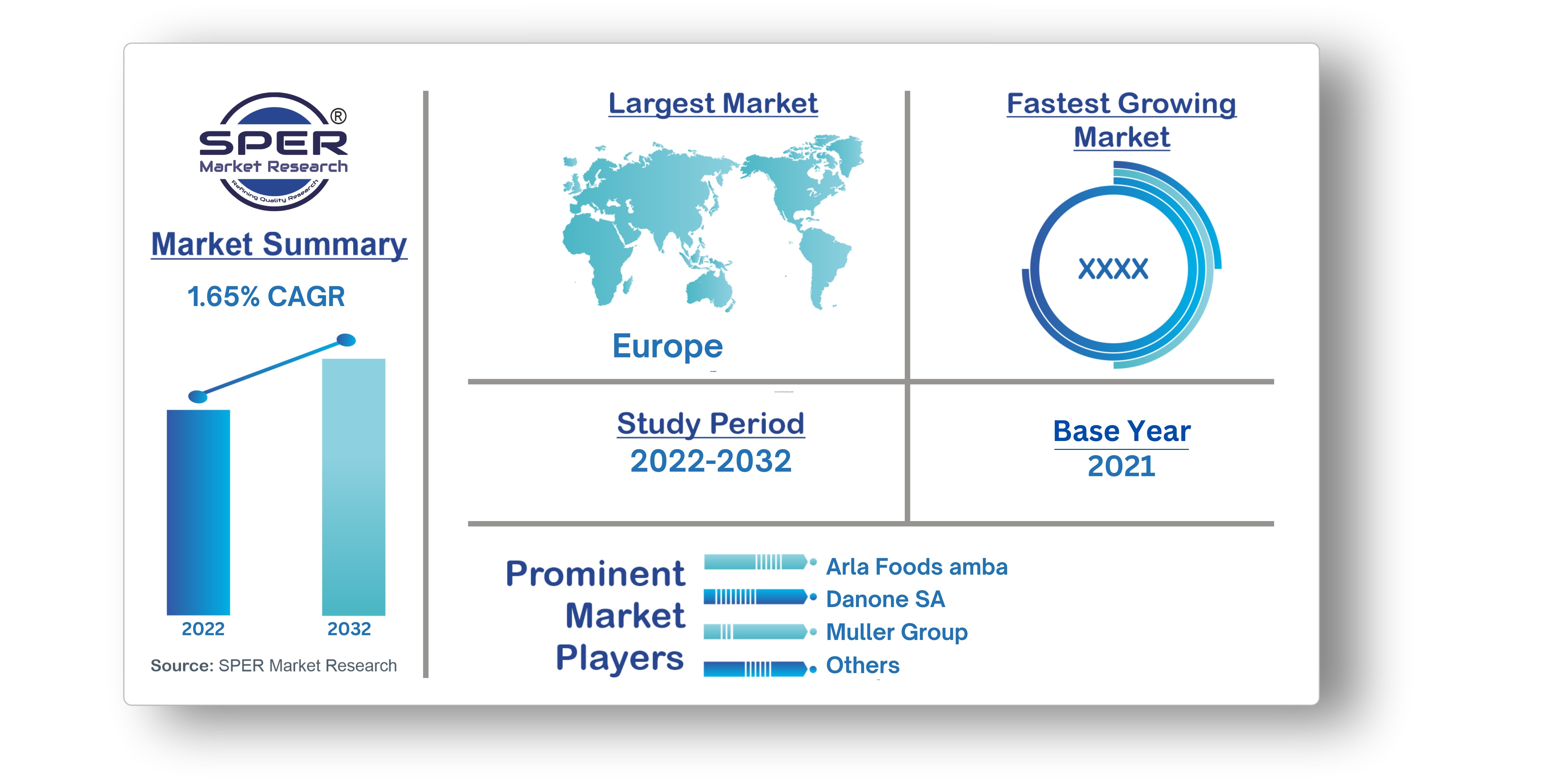
Europe Dairy Market Growth, Share, Size, Trends, Revenue, Challenges and Future Competition 2032
Europe Dairy Market Size-By Product- Regional Outlook, Competitive Strategies and Segment Forecast to 2032
| Published: Apr-2023 | Report ID: FOOD2326 | Pages: 1 - 157 | Formats*: |
| Category : Food & Beverages | |||


| Report Metric | Details |
| Market size available for years | 2019-2032 |
| Base year considered | 2021 |
| Forecast period | 2022-2032 |
| Segments covered | By Product |
| Regions covered | France, Germany, Italy, Netherlands, Spain, United Kingdom, Others |
| Companies Covered | Arla Foods amba, Danone SA, DMK Deutsches Milchkontor GmbH, Groupe Lactalis S.A., Groupe Lactalis S.A., Muller Group, Nestlé S.A, Royal Friesland Campina N.V., Savencia SA, Sodiaal International SA, Unilever PLC |
- Dairy Farmers
- Dairy processors
- Dairy products manufacturer
- Supplier
- Consumers
- Fluid Milk/UHT Milk
- Flavoured Milk
- Cream, Butter
- Anhydrous Milk Fat (AMF)
- Skimmed Milk Powder
- Non-fat Dry Milk
- Whole Milk Powder (WMP)
- France
- Germany
- Italy
- Netherlands
- Spain
- United Kingdom
- Size of Europe Dairy Market (FY’2019-FY’2032)
- Overview of Europe Dairy Market
- Segmentation of Europe Dairy Market by Product { Fluid Milk (UHT) Milk, Flavoured Milk, Cream, Butter, Anhydrous Milk Fat (AMF), Skimmed Milk Powder/Non-fat Dry Milk, Whole Milk Powder (WMP)}
- Statistical Snap of Europe Dairy Market
- Growth Analysis of Europe Dairy Market
- Problems and Challenges in Europe Dairy Market
- Competitive Landscape in the Europe Dairy Market
- Impact of COVID-19 and Demonetization on Europe Dairy Market
- Details on Recent Investment in Europe Dairy Market
- Competitive Analysis of Europe Dairy Market
- Major Players in the Europe Dairy Market
- SWOT Analysis of Europe Dairy Market
- Europe Dairy Market Future Outlook and Projections (FY’2019-FY’2032)
- Recommendations from Analyst
1.1. Scope of the report1.2. Market segment analysis
2.1 Research data source2.1.1 Secondary data2.1.2 Primary data2.1.3 SPER’s internal database2.1.4 Premium insight from KOL’s2.2 Market size estimation2.2.1 Top-down and Bottom-up approach2.3 Data triangulation
4.1. Driver, Restraint, Opportunity and Challenges analysis4.1.1 Drivers4.1.2 Restraints4.1.3 Opportunities4.1.4 Challenges4.2. COVID-19 Impacts of the Europe dairy Market
5.1. SWOT analysis5.1.1 Strengths5.1.2 Weaknesses5.1.3 Opportunities5.1.4 Threats5.2. PESTEL analysis5.2.1 Political landscape5.2.2 Economic landscape5.2.3 Social landscape5.2.4 Technological landscape5.2.5 Environmental landscape5.2.6 Legal landscape5.3. PORTER’S five forces analysis5.3.1 Bargaining power of suppliers5.3.2 Bargaining power of Buyers5.3.3 Threat of Substitute5.3.4 Threat of new entrant5.3.5 Competitive rivalry5.4. Heat map analysis
6.1 Europe Dairy Market Manufacturing Base Distribution, Sales Area, Product Type6.2 Mergers & Acquisitions, Partnerships, Product Launch, and Collaboration in Europe Dairy Market
7.1 Fluid Milk/UHT Milk7.2 Flavoured Milk7.3 Cream, Butter7.4 Anhydrous Milk Fat (AMF)7.5 Skimmed Milk Powder7.6 Non-fat Dry Milk7.7 Whole Milk Powder (WMP)
8.1 Europe Dairy Market Size and Market Share by Region (2019-2025)8.2 Europe Dairy Market Size and Market Share by Region (2026-2032)8.3 France8.4 Germany8.5 Italy8.6 Netherlands8.7 Spain8.8 United Kingdom8.9 Others
9.1 Nestlé S.A9.1.1 Company details9.1.2 Financial outlook9.1.3 Product summary9.1.4 Recent developments9.2 Danone SA9.2.1 Company details9.2.2 Financial outlook9.2.3 Product summary9.2.4 Recent developments9.3 Groupe Lactalis S.A.9.3.1 Company details9.3.2 Financial outlook9.3.3 Product summary9.3.4 Recent developments9.4 Royal Friesland Campina N.V.9.4.1 Company details9.4.2 Financial outlook9.4.3 Product summary9.4.4 Recent developments9.5 Arla Foods amba9.5.1 Company details9.5.2 Financial outlook9.5.3 Product summary9.5.4 Recent developments9.6 Unilever PLC9.6.1 Company details9.6.2 Financial outlook9.6.3 Product summary9.6.4 Recent developments9.7 DMK Deutsches Milchkontor GmbH9.7.1 Company details9.7.2 Financial outlook9.7.3 Product summary9.7.4 Recent developments9.8 Sodiaal International SA.9.8.1 Company details9.8.2 Financial outlook9.8.3 Product summary9.8.4 Recent developments9.9 Savencia SA9.9.1 Company details9.9.2 Financial outlook9.9.3 Product summary9.9.4 Recent developments9.10 Muller Group9.10.1 Company details9.10.2 Financial outlook9.10.3 Product summary9.10.4 Recent developments
SPER Market Research’s methodology uses great emphasis on primary research to ensure that the market intelligence insights are up to date, reliable and accurate. Primary interviews are done with players involved in each phase of a supply chain to analyze the market forecasting. The secondary research method is used to help you fully understand how the future markets and the spending patterns look likes.
The report is based on in-depth qualitative and quantitative analysis of the Product Market. The quantitative analysis involves the application of various projection and sampling techniques. The qualitative analysis involves primary interviews, surveys, and vendor briefings. The data gathered as a result of these processes are validated through experts opinion. Our research methodology entails an ideal mixture of primary and secondary initiatives.



Frequently Asked Questions About This Report
PLACE AN ORDER
Year End Discount
Sample Report
Pre-Purchase Inquiry
NEED CUSTOMIZATION?
Request CustomizationCALL OR EMAIL US
100% Secure Payment






Related Reports
Our Global Clients
Our data-driven insights have influenced the strategy of 200+ reputed companies across the globe.




















